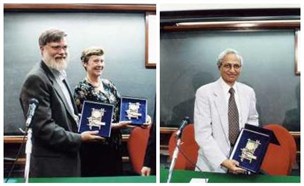Howard Georgi, Harvard University, Cambridge, USA,
Jogesh Pati, University of Maryland, and Stanford Linear Accelerator Centre, USA
Helen Quinn, Stanford Linear Accelerator Center, Menlo Park, USA
The 2000 Dirac Medal is awarded to Howard Georgi, Jogesh Pati and Helen Quinn for pioneering contributions to the quest for a unified theory of quarks and leptons and of the strong, weak, and electromagnetic interactions.
The award to Pati notably recognizes his formulation (with Salam) of the original gauge theory with quark-lepton unification, and their resulting insight that baryon number violation is a likely consequence of such unification. Much of this work was done at the ICTP in the early 1970's. The award to Georgi recognizes his discovery of many of the most significant models of grand unification, including the SU(5) model (with Glashow) and the SO(10) model, as well as his role in the Georgi-Quinn-Weinberg computation showing that the natural mass scale of unification is relatively close to the Planck scale, and that the proton lifetime can naturally be extremely long. Finally, the award to Quinn recognizes the Georgi-Quinn-Weinberg computation, as well as her fundamental insights (with Peccei) about CP conservation by strong interactions.

















